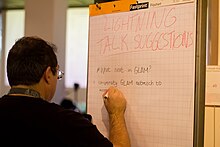GLAM/Newsletter/December 2011/Contents/Netherlands report
|
GLAMcamp Amsterdam

There was a lot of food eaten during GLAMcamp Amsterdam, held December 2-4 at MediaMatic Lab, Amsterdam. Piles of stroopwafels and copious amounts of Tim Tams were consumed, although that's not to say attendees weren't productive from a GLAM perspective.
Coming from 21 different countries, the Wikimedians submitted almost 30 proposals for lightning talks, to share innovations behind their own projects and/ or ask for review and support. The weekend also offered 20 sessions where attendees worked on topics of interest to them. Feedback was offered, tools were hacked and new ideas were innovated.
There was time for fun, too, though. On Saturday evening, attendees went on a backstage tour of the newly-renovated Amsterdam Museum and on Sunday, they were treated to a tour of the Philips wing of the Rijksmuseum.
Friday

The first day of the conference, Friday December 2 began with Jessica Tangelder, the project manager for the event, welcomed Wikimedians and described what was to come over the weekend. The attendees then introduced themselves before the team who had been working on the GLAM toolset project explained the essence of the project.
After a lunch prepared by MediaMatic staff, cultural sector professionals began to arrive for the public workshop. Following a welcome from founder of the MediaMatic Lab Willem Velthoven and an announcement of a free content search interface from developer Thijs de Boer there were three keynotes.

The first was from Dr. Margriet Schavemaker, Head of Collections and Research at the Stedelijk Museum on "Tricks and traps of sharing modern collections online". Next, David Haskiya, a product developer for Europeana discussed how the Europeana strategic plan was compatible with Wikimedia. He suggested that First World War-related content could be used during the centenary of the war, in 2014. Slides from his talk can be found on Commons. Frank Meijer, Project manager of Museum digitization at the Tropenmuseum gave the final presentation: "What is working with Wikimedia really like?".
Networking was an important part of the event and museum professionals then chatted with the Wikimedians over drinks at the MediaMatic Lab bar. The evening ended with dinner at the De Balie Grand Cafe.
Saturday
The second day, Saturday, began with a set of lightning talks on topics ranging from this newsletter to Freedom of panorama (or lack thereof) in France and archaeology and its compatibility with Wikimedia.
Parallel sessions during the day included how to begin a GLAM program in a country where one does not already exist, how to improve out internal communication (including a shoutout to TMIG), drafting a "freedom declaration". There were also sessions on QRpedia (during which what we believe to be the first QRpedia code in a Netherlands GLAM was deployed), building glamwiki.org as a separate website and Commons:Wiki Loves Monuments 2012 in 2012.
There was also a surprise visit from Saturday's surprise keynote presenter: Sinter Klaas. He distributed gifts (out of a cloth Wikimania bag), handed out sweets and left almost as quickly as he had arrived.
Amsterdam Museum tour

On Saturday evening Wikimedians were given a backstage tour of the Amsterdam Museum. The "Amsterdam DNA codes" (QR codes on guide booklets which, when scanned, would play a short film in the language of the booklet) were presented by one of the developers of the tool, in addition to an introduction to the archives and an insight into the museum's painting collection.
The Wikimedians and museum staff then walked to a nearby restaurant where they had dinner together and continued networking.
Sunday

The final day of the event, Sunday, saw the last few lightning talk submissions before breaking out for the penultimate parallel sessions. Among other things, Wikimedians worked on improving documentation, especially best practices, and improving statistics and metrics. After a short break for coffee, the attendees split up again to discuss outreach to diverse groups, improving documentation especially if related to Wikipedians in Residence and continuing work on statistics.
Further reading
- Photos on Commons
- Blog posts
- Etherpads:
| Home | About | Archives | Subscribe | Suggestions | Newsroom |

